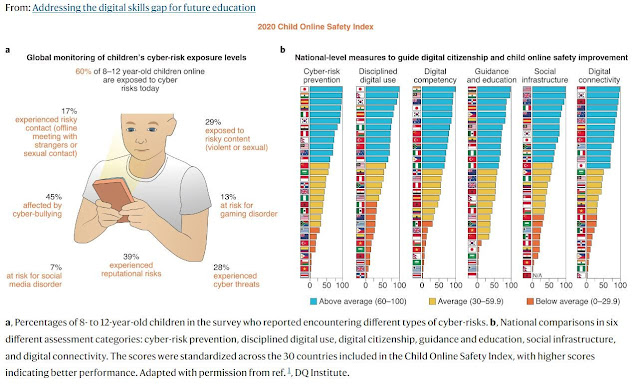You can't have 'generative' AI without massive data sets to train it on. This data is scraped from the internet and then fed into systems that can eventually give users "a statistically likely configuration of words" that look like an answer. That's right, the brilliant answer you just got on a generative AI platform isn't really an answer, it's a cloud computer cluster giving you its best guess based on crowdsourced data. None of that stops people from thinking it's intelligent (it isn't), and being in a panic about missing out.
Putting the fact that AI isn't nearly as smart as the marketing portrays it aside for a moment, large data and the cloud infrastructure that stores and delivers it are a house of cards teetering on the edge of collapse. You can't have AI without climbing to the stop of this wobbly infrastructure. How precarious is it? Data growth worldwide is in an explosive phase of growth (partially driven by the AI fad). Our overloaded storage infrastructure is under pressure because AI uses it much more aggressively that simply storing information. AI demands fast data retrieval and constant interaction making the rise in AI particularly problematic for our stressed storage systems.
We're facing data storage shortages in the next couple of years because of our belief that the cloud is an infinite resource. It isn't, it's an artfully hidden technological sleight of hand. The irony is that our digital storage infrastructure limitations will also end up limiting our current crop of AIs as well.
The staggering environmental costs that underlie our myth of an infinite digital cloud haven't been mentioned yet, but like many of our other ecological marketing myths (electric vehicles), pushing the messy business of how it works out of sight of the consumer is a great way to market a green future while doing the opposite. Data centres in the US consume over 2% of all electricity in the country. There are benefits to scaling large data centres, but the trend into the foreseeable future is that the cloud will continue consuming more energy out here in the real world. That we're increasingly throwing limited resources at building AI guessing machines tells you something about our priorities.
One of the first posts on Dusty World was about dancing in this datasphere twelve years ago. Back then I'd found a quote by Google CEO Eric Schmidt talking about the coming information revolution:
 |
| I'd make a distinction between information and data. One is useful, the other is raw binary numbers and storing the majority of it is a complete waste of time and resources. Sussing out information from data is an ongoing challenge. That doesn't change the fact that the amount of data being generated back then wouldn't even register on the graph below, which looks like a runaway growth curve - you can make good money from all that data. |
From an educational perspective, AI is in the wild now and ignoring it will only get you and your students in trouble. If we're going to make functional use of this progenitor of true artificial intelligence, we need to teach the media literacy around it so that people understand what it is, how it works and how best to use it to amplify rather than replace their humanity.
I've seen a lot of people panicking about AI taking their jobs away, but if your work output is a statistically likely configuration of words, then you're not applying much of your vaunted human intellect to the task at hand and probably should be replaced by one of these meh AIs. But if you're one of those humans who actually thinks, even this stunted AI can be a powerful ally. In a fight for intellectual supremacy who would you think would win?
- just machines
- just people
- an empowered hybrid of the two
The other day I described AI as we currently define it as a hack to keep classical computing ahead of the data tsunami we're living in. At the time I was surprised by how I described it, but classical computing is reaching the limit of what it can do. For the past few years we've been finding speed in parallel processing such as adding computing cores to CPUs rather than making faster ones. We've also been finding efficiencies in how we manage data such as creating more organized memory caches to better feed our processors. Ultimately, I feel like generative AI in 2023 is another one of these patches. It's a way to make our overwhelming data cloud more functional to us.
 |
| This is from a presentation I've been giving that attempts to bring people into a better understanding of the hype. AI (even this meh one) will replace you if you let it, so don't! |
Digital technologies aren't going to go anywhere, but they are a 'low resolution' way to compute. There is also the problem of reducing the complexity of reality to ones and zeroes. Mathematical concepts can help us understand relationships, but they will always be inherently reductive; they're never the thing itself but a simplified abstraction of it. Digital reduces the world to ones and zeros, but there is a better way.
When we run out of nanometres like we have with electronics, the next step is a big one, but it's one we're working on globally as a species right now. In the next decade we're gong to figure out how to use the building blocks of nature itself to compute at speeds that classical computers can't imagine. What will this do for our data clogged world? One of my hopes is that it will process much of that data into usable information, information that we can then use to solve this mess we've gotten ourselves into. When you have an answer you no longer need to keep the information leading to it.
I'll weather the current AI hype storm, but if you ask me what I'm really excited about it's artificial intelligence realized on a fault tolerant quantum computer. The future beyond that moves in directions I can't begin to guess, and that is exciting. imminent and absolutely necessary if we're going to prevent a global collapse of human civilization. Some people might get panicky about that, but they're the same ones who think a cloud based statistical guessing machine will replace them.








